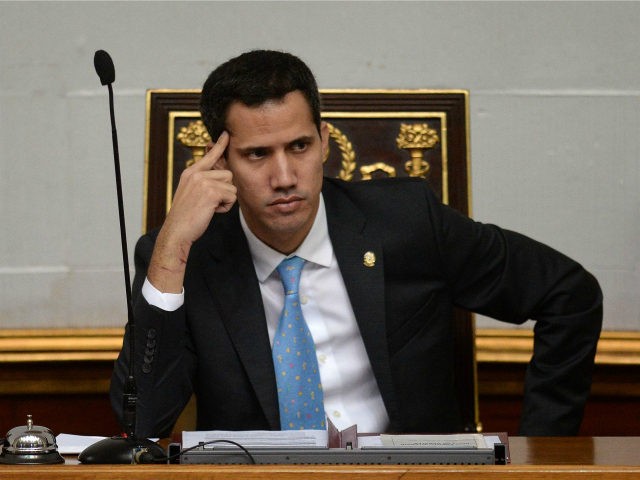Venezuelan President Juan Guaidó sent a delegation to Norway for talks with the rogue Nicolás Maduro regime but insisted Sunday that the talks were “mediation.”
The government of Norway has imposed itself as a neutral mediator between Guaidó and Maduro, who has not legally been president of Venezuela since January and refuses to leave the presidential palace. Maduro’s henchmen still control the nation’s armed forces, making it impossible for Guaidó to remove Maduro from office.
In late April, Guaidó announced in a social media appearance at dawn that he had convinced the leadership of the military to obey him as their legitimate commander-in-chief. By the end of the day, however, Maduro had disputed Guaidó’s claim and deployed his Bolivarian National Guard (GNB) to repress the protesters who had listened to Guaidó’s call for street protests. Reports followed of mass confusion in the Venezuelan military, as soldiers did not know if their superiors were taking orders from Guaidó or Maduro.
Rumors began surfacing last week that Guaidó had decided to switch gears following the failure of his military uprising and engage the Maduro regime in talks. The president claimed at the time that he would not engage in “false dialogue” and that he was, instead, “combining all [their] strategies, using all the tools [they] have,” including both talks and street protests.
Guaidó also sent his U.S. ambassador, Carlos Vecchio, to meet with the Pentagon on a potential military solution to the Maduro regime.
Guaidó confirmed on Sunday that he had sent a delegation to Oslo to meet their Maduro counterparts.
“We should properly verbalize the Norway thing,” he said, according to Venezuela’s El Nacional. “We cannot use the regime’s narrative. It is an invitation to mediation on the part of Norway. That is to say, it is not a negotiation or a dialogue.”
“We are not depending on the good faith of a dictator,” he insisted, adding:
They have tried to confuse us. That is a dialogue, that it is surrender, that this gives them time … do you think that a dictator will happily leave? That is why we have a thousand political prisoners in Venezuela today. It is evident that we are not depending on, or believing in, the faith of a murderous dictator or any of his initiatives.
Guaidó added that any talks must lead to free and fair elections.
“Whoever does not understand that we have to play on every field, that we have to be actively present everywhere … they are cooperating with another cause,” Guaidó said, accusing anyone who disagreed with his participation in meetings with the Maduro regime of being Maduro’s “accomplice.”
On Twitter, Guaidó posted a message Sunday attempting to differentiate his strategy from that of the socialist Democratic Unity Roundtable (MUD), an establishment opposition coalition with socialist elements that engaged in talks with Maduro from 2014-2017, allowing Maduro time to strengthen his dictatorship through negotiations with Russia and China that brought in billions of dollars and an advanced surveillance and cyber-operations system to stunt opposition movements. The dialogue era proved deadly for many participating in protests against Maduro. In 2017, the last year with significant attempts at dialogue, 5,535 people died at the hands of Maduro’s police or soldiers.
Guaidó is a member of the socialist Popular Will political party, a member of the MUD coalition.
“The big difference in this process is that today we have all the tools to achieve change and we will work with each and every one,” he wrote. “The route is defined and the variable that will determine our success is to stay in the streets. The regime will not have time to win”:
Guaidó similarly protested last week when the first reports surfaced that he had begun engaging the regime in talks. “We went,” he confirmed at the time, “but, of course, not to engage in anything” – leaving open questions of why his envoys went if they had no intention of engaging “in anything.”
The Maduro regime celebrated the Norway talks on social media, claiming that Maduro has “called for dialogue on over 600 occasions.” The dictator sent Hugo Chávez’s son-in-law, Foreign Minister Jorge Arreaza, as the leader of the delegation, whom he said would “represent the voice of the people.”
The regime’s allies in Russia also applauded the move.
“Moscow welcomes the announcement about the continuation of contacts between the Venezuelan government and opposition being held in Oslo through Norway’s good services,” the Russian Foreign Ministry said in a statement. “We call on all states involved in the Venezuela situation to support the launch of the political process in the form of talks between the country’s major forces, refraining from issuing ultimatums to Venezuela’s leadership.”
The United States – one of dozens of nations around the world that have ceased recognizing Maduro as head of state – issued a statement, as well, saying that it hopes “the conversations in Oslo are centered on the objective” of “the Venezuelan people recovering their democracy and ending the illegitimate Maduro regime.”
Speaking on Saturday, Vice President Mike Pence appeared to oppose any new talks. “The time for dialogue is over,” he said in an interview with CNN. “The time for action is here. It is time for Nicolás Maduro to go. We are committed to standing with the Venezuelans until they restore their freedom.”

COMMENTS
Please let us know if you're having issues with commenting.